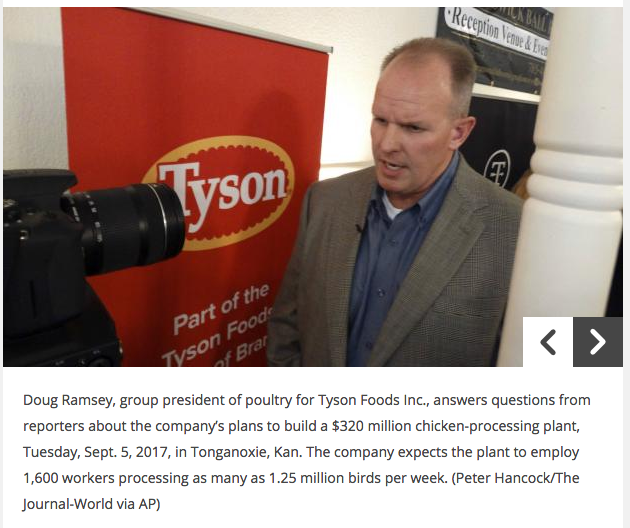The Topeka Capital-Journal: Tyson to build $320 million poultry processing plant in northeast Kansas, generate 1,600 jobs
By Tim Carpenter | September 5, 2017
TONGANOXIE — Tyson Foods executives and government leaders divulged details Tuesday of a $320 million chicken processing plant to be constructed in Leavenworth County that could generate 1,600 jobs in northeast Kansas after starting production in mid-2019.
The 300-acre project south of Tonganoxie near Interstate 70 would have an estimated $150 million annual economic benefit to the state. Tyson’s plan calls for construction of a chicken hatchery, feed mill and poultry processing plant, with groundbreaking on the complex to occur this fall. The company intends to contract with local farmers and ranchers to raise chickens in 300 to 400 poultry houses.
“So, why would we build it here? That’s the question a lot of folks have asked,” said Doug Ramsey, Tyson’s group president for poultry operations.
The answer to his question was delayed by a handful of people shouting, “We don’t want it.”
“I appreciate your opinion,” Ramsey said.
“Not enough,” a woman replied.
“We believe eastern Kansas is the right location because of the availability of grain and labor, as well as access to our nationwide customer base that is accessible through the state’s top-notch transportation network,” Ramsey said. “It’s the perfect place.”
The announcement also sparked street protests outside a downtown Tonganoxie meeting hall. Stephanie Ventura, holding a “Family farms not factory farms” sign, said Tyson would become a bully in the poultry production industry and undermine established small-scale farmers in the region.
“They pump them full of antibiotics,” said Jana Fackrell, a protester who dismissed a Tyson pledge to make the Tonganoxie plant part of the company’s program to keep antibiotics out of chicken sold to retailers. “I don’t believe it for a second.”
Ramsey said the company would in a couple months schedule town hall meetings or speak individually with people to respond to concerns about production practices, including waste handling, or other economic and environmental issues.
The Tyson plant would be designed to generate pre-packaged trays of fresh chicken for grocery stores. It will be engineered to process up to 1.25 million birds each week.
Tyson operates in six Kansas communities and employs 5,700 in Hutchinson, South Hutchinson, Garden City, Holcomb, Emporia and Olathe. In the 2016 fiscal year, Tyson officials said, the company paid Kansas cattle suppliers $2 billion and Kansas hog suppliers $1.3 billion for providing meat to other company processing facilities.
Leavenworth County commissioners agreed last week to support the Tyson initiative by issuing $500 million in industrial revenue bonds, which would be repaid over 10 years. County officials also committed to spend $7.4 million to extend utilities to the plant site, while the city of Tonganoxie plans to invest $1.2 million to link sewer lines to the project.
Nick Jordan, secretary of the Kansas Department of Commerce, said the state would make economic development incentives available to Tyson. He said value of state tax breaks couldn’t be disclosed until contracts were signed, but competition for the Tyson plant necessitated involvement of the state.
“There were other states that we were competing with,” Jordan said.
Gov. Sam Brownback led off the event attended by about 200 people, including cabinet secretaries of agriculture and transportation and representatives of Leavenworth County and Tonganoxie.
“Growing Kansas means we must grow the food and agriculture sector which accounts for nearly 45 percent of the state’s economy,” said Brownback, who grew up on a hog-and-crop farm in Parker. “This is a step in the right direction to further diversify and grow our state’s economy.”
He said the Tonganoxie facility about 40 miles east of Topeka would be held to every standard established by government units in Kansas.
“I’m delighted to hear they’re going to have a series of town hall meetings in the area to listen to and hear about peoples’ local concerns, which are legitimate, need to be heard and need to be addressed,” the governor said.
